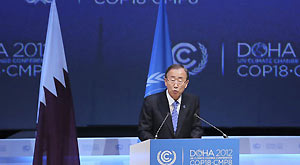Doha Talks End with Slight Progress
China Daily, December 10, 2012 Adjust font size:
The deal includes an eight-year extension of the Kyoto Protocol ensured by the EU, Australia, Switzerland and other industrialized countries, which agreed to binding emission cuts by 2020.
But the limited scope of the second commitment period of the Kyoto Protocol and weak financial commitment from developed economies disappointed developing economies.
Under the final document, an overall maximum of 18 percent emissions reductions from 1990 levels has been set for less than 40 developed economies under the protocol.
According to the Intergovernmental Panel on Climate Change's Fourth Assessment Report in 2007, developed economies as a group would have to reduce emissions by 25 to 40 percent from 1990 levels to keep temperature rises within an acceptable range.
A midterm review that would reassess the scope of their commitments has been arranged for no later than 2014. "But developed economies don't really have to raise the scope by then," said Li Shuo, a climate and energy campaigner at Greenpeace East Asia.
The issue of excess emissions allowances ― which total 13 billion tons in greenhouse gases ― was the most contentious topic during the last 24 hours of the discussions.
Strong objections have been raised over allowing the carryover of excess emissions permits, which would result in greenhouse gas levels decreasing only on paper, not in the atmosphere.
The two biggest proponents of excess emissions allowances, Poland and Russia, at first insisted on their lenient limits being carried over beyond 2012.
Poland initially refused to sign the second commitment deal until it received assurance from member states that it would receive flexible treatment on emissions cuts.
Russia, Belarus and Ukraine also insisted on the carryover, as the pollution permits they were given allow their heavy industries to thrive.
The Doha deal also establishes a loss-and-damage mechanism that helps the most vulnerable countries deal with the adverse effects of climate change.
"It's huge breakthrough," said Khor of South Center.
The Doha conference ensured the second commitment period of the Kyoto Protocol, the only legally binding agreement for addressing global warming, but also paved the way for a new global climate regime after 2020.
The Doha climate talks are a modest step toward a global climate deal in 2015, said Hedegaard, adding there will be more climate battles in the coming years.


